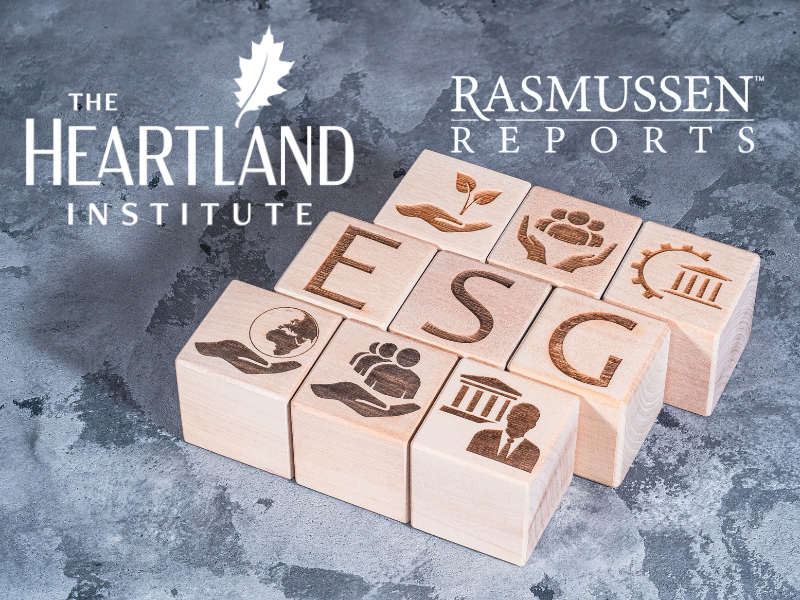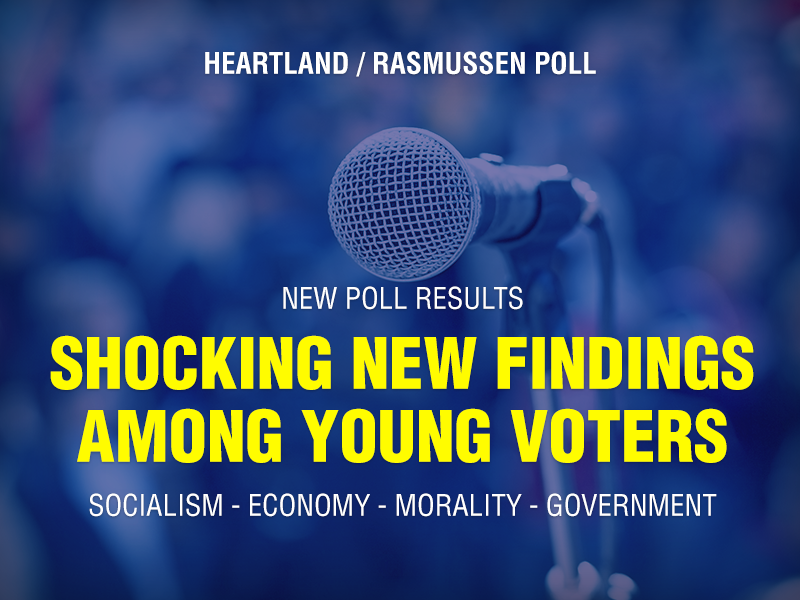More than six in 10 Americans who are familiar with ESG scores support blocking financial institutions from using them
Over the past few years, the use of environmental, social, and governance (ESG) scores in evaluating financial services offered to ordinary Americans and businesses of all sizes has increased rapidly. More generally, the use of ESG-type scoring systems has become a worldwide phenomenon.
A few months ago, the European Union (EU) instituted one of the most far-reaching ESG programs, rivaled only by the Chinese Communist Party’s societal-wide ESG system. The EU’s Corporate Sustainability and Due Diligence Directive (CSDDD) will profoundly impact businesses throughout the United States, forcing them to adhere to rigid EU ESG standards.
The Heartland Institute and Rasmussen recently conducted a new national survey of likely voters seeking their opinions on the EU’s CSDDD and the use of ESG scores in the United States. (See below for the full results.)
By a slight margin, most Americans oppose EU legislative efforts to force U.S. businesses into adhering to the recently passed CSDDD. However, this issue splits along party lines with most Democrats favoring the EU’s quest to enforce CSDDD on U.S. businesses whereas Republicans strongly oppose the measure.
By a larger margin, most Americans support a law that would prevent U.S. businesses from having to comply with the CSDDD. Once again, Democrats and Republicans remain on opposite ends of this issue.
Only 30% of likely voters are familiar with ESG scores. However, among those who are familiar with ESG scoring system, the overwhelming majority (64%) would support a law that would stop financial institutions, including banks and insurance companies, from using non-financial ESG scores when determining financial decisions such as loans and access to other financial services.
Likely voters who are familiar with ESG scores also narrowly favor a law that would prevent large public corporations from refusing to do business with anyone based on their political views, religious practices, or associations. Interestingly, this sentiment was expressed almost identically on behalf of both Democrats and Republicans.
The following statements from ESG experts at The Heartland Institute – a free-market think tank – may be used for attribution. For more comments, refer to the contact information below. To book a Heartland guest on your program, please contact Director of Communications Jim Lakely at [email protected] and 312/377-4000 or (cell) 312/731-9364.
“Fortunately, most Americans understand the dire threat to American businesses posed by the European Union’s tyrannical Corporate Sustainability and Due Diligence Directive, which is arguably the most insidious attempt at achieving the elites’ globalist vision I’ve ever seen. It must be stopped at all costs, which I am glad to see the American people overwhelmingly support. Furthermore, it warms my heart that most Americans who are aware of ESG scores oppose their implementation in the United States. The use of biased, non-financial ESG scores is a fundamental threat to all Americans who value liberty and the notion of equal opportunity and equal treatment for all—regardless of their political affiliations, religious views, and opinions.”
Chris Talgo
Research Fellow
The Heartland Institute
[email protected]
“The results of this poll are surprising, to say the least. On one hand, it is highly concerning that 43 percent of respondents support the European Union’s efforts to impose their economic policies and value systems upon the rest of the world, including the United States, thereby completely circumventing our national sovereignty and democratic processes. Equally concerning is that 38 percent of respondents would not support any effort to protect the United States from essentially becoming a vassal state of the European Union. Hopefully, as Americans begin to receive more information about this problem, they will oppose it in greater numbers.”
“On the other hand, it is encouraging that a strong majority (62 percent) of Americans who are familiar with what ESG entails support legislation that would restrict the ability of financial institutions using ESG to discriminate against companies and individuals who do not have a sufficiently high social credit score. It has become increasingly likely that Republicans will control the presidency and both chambers of Congress in 2025. This poll suggests that any actions taken by our elected representatives to combat corporatist ESG policies pushed by oligarchic controllers and subservient unelected bureaucrats would be well-received by a strong majority of the American public.”
Jack McPherrin
Research Editor
The Heartland Institute
[email protected]
The Heartland Institute is a national nonprofit organization founded in 1984 and headquartered in Arlington Heights, Illinois. Its mission is to discover, develop, and promote free-market solutions to social and economic problems. For more information, visit our website or call 312/377-4000.
Survey of 2,466 US Likely Voters
Conducted July 5-12, 2024, By Rasmussen Reports and the Heartland Institute
- The European Union Recently passed a law called the Corporate Sustainability and Due Diligence Directive. The law will impose strict environmental, climate, and social justice rules on many large businesses headquartered around the world. Under the new EU law, many large American businesses, as well as small and medium-sized companies in their supply chains, will be forced to adhere to European rules or else pay a large fine or face lawsuits.
Do you support or oppose legislative efforts by the European Union to control American business practices, such as the EU’s Corporate Sustainability and Due Diligence Directive?
21% Strongly support
22% Somewhat support
13% Somewhat oppose
33% Strongly oppose
11% Not sure
2. Would you support or oppose a U.S. federal or state law that would protect American companies from being required to comply with the European Union’s new supply chain law?
30% Strongly support
19% Somewhat support
17% Somewhat oppose
21% Strongly oppose
14% Not sure
3. Environmental, social, and governance scores — commonly called ESG — are a kind of social credit scoring system used by financial institutions, investors, and some governments. Are you familiar with ESG scores?
30% Yes
57% No
13% Not sure
Answered by the 764 respondents who are familiar with ESG:
- Would you support or oppose a law that would stop financial institutions like banks and insurance companies from using non-financial ESG scores when evaluating individuals and businesses applying for products or services, such as a loan?
42% Strongly support
20% Somewhat support
14% Somewhat oppose
18% Strongly oppose
6% Not sure
- Would you support or oppose a law that would stop large public corporations from refusing to do business with people based on their political or religious views, practices, or associations?
28% Strongly support
16% Somewhat support
15% Somewhat oppose
25% Strongly oppose
16% Not sure
NOTE: Margin of Sampling Error, +/- 3 percentage points with a 95% level of confidence






